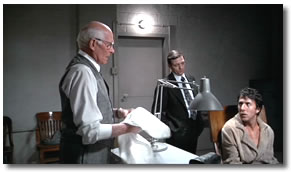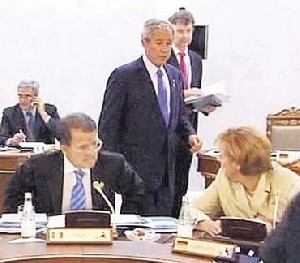
July 18, 2006 | Shortly before Thanksgiving 2004, I took my three kids camping in Mistletoe State Park near Augusta, Ga., with my best friend and his two kids. After six years in Savannah, my family was about to move to France for my wife's new job as an administrator for an American company. We had all been camping together before and figured the trip would be a great getaway from all of the packing, painting and stresses of moving, and would allow the kids to be together for one last time. Our wives decided to stay home to organize the packing and spend some quiet time together to say goodbye.
For us, camping has always been a back-to-basics experience. We pack in all food and supplies to our remote site and take out trash and whatever is not consumed. For toilets, we dig holes with entrenching shovels and cover our traces. We teach our kids respect and responsibility in the forest. And we teach them to have a good time.
During the three-day weekend trip, we fished and cooked kielbasa, hot dogs and marshmallows over an open fire. We pitched our tents near the tip of a small peninsula jutting into Clarks Hill Lake, where red clay beaches rimmed our site. We scoured the water's edge for mussel shells and arrowheads and skipped sleek stones on the water. The days were clear and cool, with high blue skies and wisps of moving clouds. Although the nights were cold, the weekend was as perfect as we could have hoped for.
The kids ran from one thing to the next with abandon, one minute scavenging wood for a fire, and the next returning breathlessly to tell us they had spotted a deer. At night, the tall pines sawed in the wind as my friend, whom I'll refer to as Rusty, melted aluminum cans in the campfire using a tin can as a crucible. His crude alchemy and the sudden sense of the world as laboratory lighted our imaginations as he poured the quicksilver-like liquid over the rocks ringing the fire. The kids grew excited and impatient, studying the metal-coated rocks and waiting for the aluminum to cool into odd-shaped medallions they salvaged as mementos.
Later, after the kids had gone to bed in their tent and the cold descended, Rusty and I sat in our camp chairs, having a beer and warming our boots a little too close to the fire. I still wear that pair of Wolverines with the half-melted soles. And every time I put them on, I think of what happened when we returned from that weekend and how it changed all of our lives.
As usual during the trip, we took several photos. Because I forgot my digital camera, I bought a disposable camera at a gas station on the way to the campground. I took pictures of the kids using sticks to beat on old bottles and cans and logs as musical instruments. I took a few of my youngest daughter, Eliza, then age 3, skinny-dipping in the lake, and my son, Noah, then age 8, swimming in the lake in his underwear, and another of Noah naked, hamming it up while using a long stick to hold his underwear over the fire to dry. Finally, I took a photo of everyone, as was our camping tradition, peeing on the ashes of the fire to put it out for the last time. We also let the kids take photos of their own.
When we returned on Sunday, I forgot the throwaway camera and Rusty found it in his car. He gave it to his wife, whom I'll call Janet, to get developed, and she dropped it off the next day with two other rolls of film at a local Eckerd drugstore. On Tuesday, when she returned to pick up the film, she was approached by two officers from the Savannah Police Department. They told her they had been called by Eckerd due to "questionable photos."
One officer told Janet "there were pictures of little kids running around with no clothes on, pictures of minors drinking alcohol," she recounted for me in an e-mail. "I asked to see the pictures and was told I couldn't. I explained there must be a mistake. I was kind of laughing, you know, 'Come on guys. There must be an explanation. This is crazy. Let me see the pictures.' The officer told me that he personally did not find [the photos] offensive and that he had camped himself as a kid and knows what goes on." But the officer also told Janet that "because Eckerd's had called them and that because there were pictures of children naked, genitalia and alcohol, they would have to investigate."
Janet asked the photo lab clerk what was on the photos and the clerk "replied very seriously that they were bad, that there was one that looked like a child's head had been cut off, one with children drinking beer and pictures of naked kids." As she drove to her house, Janet said, "I was in shock and felt sick to the pit of my stomach and was trying to process all of it." She called my wife, who was driving home, and explained what had happened. Sensing how bad this might become, my wife pulled her car to the side of the road and fought the urge to throw up.
Neither my wife nor I, Rusty nor Janet has a criminal record of any sort. Yet over the next several weeks, the Savannah Police Department and the Department of Family and Child Services (DFCS) investigated us for "child pornography" and then "sexual exploitation of a minor." We suffered the embarrassment of having DFCS interview our family, friends, employers and our children's teachers, asking them whether we were suitable parents and what kind of relationship we had with our kids.
During that time, my wife and I, our children and friends, lived in a kind of suspended animation, a limbo of unreality where our privacy was invaded and we were stripped of our sense of dignity and seemingly our rights. To be accused unjustly of any crime is a terrible thing. But to be accused of using your own children for pornographic purposes or sexual exploitation bears a special taint because no matter how highly people think of you, they don't know you in your most intimate moments, which forever leaves you open to suspicion.
Being investigated for child pornography is so grave that people might assume it has to be based in fact. And yet I would learn, as so many other horrified parents have, that it can begin simply by somebody picking up the phone.
"It's not going to be a big deal," Rusty told my wife, not long after we all heard the news. But after Rusty's initial visit to the police station to explain the photos to the officers, our optimism began to wane. "It was evident the police did not view us as innocent until proven guilty," Rusty told me in a recent e-mail. "I sought out the officer in charge of the unit that investigates these 'crimes,' and when he finally agreed to meet with me he was rude, unprofessional, and very accusatory before hearing from anyone involved."
The police, however, didn't file any charges against us. But they had digitized six of the photos and sent copies to DFCS for further investigation, which is standard practice in such cases. The officers wouldn't let Rusty see any of the photos in the station, and so we had no idea what was on them, as we had allowed the kids to take photos of their own. One of the photos, an officer said, showed a child drinking beer.
After our case was turned over to DFCS, we began what seemed like an excruciatingly long period of waiting to hear what would come next. As the days ticked by, Janet told me, "It was impossible for me to function, concentrate or focus on work. I couldn't eat, felt sick and scared." My wife and I began to question even our routine judgment because of a sudden awareness of being observed by some unseen entity that seemed everywhere and nowhere at once. A hug or a quick goodnight kiss with our little girls and boy suddenly seemed questionable. Were my hands in the wrong place? Did that kiss on the corner of the lips of my 3-year-old look more than merely innocent to someone? A pat on the bum as our kids ran past suddenly seemed dangerous through our second-guessing, suddenly all-critical eye.
Each intimate moment entailed a profound searching, an almost paralytic invasion of our deepest privacy. We began to observe ourselves until each moment became one long scrutiny and the pressure it created in our daily lives grew and grew. We feared that if we were found guilty, our children would be taken away and put in a foster home. We worried about my wife's new job in France because we might have to stay in the U.S. to fight any charges. Everything was pure assumption because DFCS didn't communicate at all and so we were left to imagine the worst.
Our friend Rusty stood to lose his prominent job in government, which he had held for years, simply from the appearances of the investigation. "I waited in constant anxiety of the wildfire of whispers about my arrest for being a child pornographer, molester or worse," he said. "It was terrifying."
At this point, our children, who were already stressed by the upcoming move and leaving their schools and friends, were unaware of what was happening. Like Janet and Rusty, we tried to keep it that way by not discussing the case around them. But our kids knew by our blank stares and depressed demeanor that something was seriously wrong. As the pressure grew, my wife and I began to lose our tempers more often over small, simple things. I would explode when my daughter spilled a glass of Juicy Juice at the dinner table or overreact and deny everything when the kids would ask us if there was something wrong. And then I would be overcome with guilt and shame at my inability to take control of what was happening to us.
At night, my wife and I lay side by side in bed in the darkness, staring up into the ceiling, unable any longer to find words in the face of the vast, voidlike possibility of losing our children based on pure accusation. It was a secret too painful to keep but impossible to talk about to anyone else. We felt ashamed simply by association with the charge. As a journalist, I have lived for weeks in terrible conditions in war refugee camps and been under fire on the battlefield. But those weeks of waiting and wondering what would happen to our family were by far the most stressful I have ever experienced.
On the advice of my wife's mother, a former Florida public utilities commissioner, we contacted Mills Fleming, a local lawyer who was also a childhood friend of my wife. We needed expert help navigating the accusations. He told us that when he contacted the Office of Child Protection at the Chatham Department of Family and Children Services, the agency was surprised and annoyed that we had retained a lawyer. We were shocked it wasn't routine.
But that was the least of his revelations. We soon discovered that we had no right to retain a lawyer on our children's behalf. DFCS would become protector of our children and judge as to the validity of the charges against us. The presumption of innocence until proven guilty had been turned on its head: The burden had been placed on us, not the legal system, to prove our innocence. Our most basic right and instinct as parents -- to protect our children -- had been usurped by a single accusation.
Over the next few weeks, our only communication with DFCS was through Mills. He told us the agency would call on Thanksgiving and announce what they were going to do about our case. We had planned to leave for the long weekend but stayed home and waited for word from DFCS. They never called.
Afterward, I spent the days taking the kids off to school and preparing the house, climbing up nearly three stories on a ladder to paint. At times I became so lost in an absorbing daydream of sorting through the events that I almost stepped right off the ladder. Terrified at my complete lack of awareness, I would force myself to focus. I would dip my brush into the paint and drift off into the possibility of what might happen if a police officer or sheriff's deputy appeared at our front door with papers to take our children. As I stroked the brush along the boards, I became lost in intricate, heated conversations that led to arguments that devolved into helpless anger. We had no understanding of the process and the DFCS bureaucracy seemed some large, amorphous beast threatening us from just beyond our view.
I began to feel dangerously angry. When my anger and fear were such that I was having difficulty coping, I called my brother in North Carolina, who knew nothing about the charges. He is two years older than I am and we have always been close. I thought he might help me put things into some sort of perspective. I wanted to call him numerous times but I hesitated because of my shame. I wanted to solve this on my own.
But now I felt I was starting to come apart and feared I might do something that could wind me up in jail. I had no choice but to call. But he wasn't home and when his answering machine came on, the sudden realization of what was happening to me, and the reason I was reaching out to him, caused me to simply break down and cry. I hung up without leaving a message and he told me later that from the crying on the phone, he was certain someone close to us had died.
As Christmas approached, our lawyer felt that the DFCS investigation into sexual exploitation of a minor was running aground because the agency began airing the possibility of charging us with a lesser crime. Now they wanted to hit us with "endangerment of a child," the result of letting the kids be near an open campfire. The suggestion seemed absurd, given that nearly every weekend of the year, parents across the country go camping with their children and roast marshmallows over an open fire. My wife, our friends and I felt that DFCS was on a fishing expedition, but one with potentially dangerous consequences.
The agency had requested to interview our children at the Children’s Advocacy Center, a safe haven used for questioning children who have been sexually or physically abused, or have witnessed violence. But we resisted because we were not allowed to have a lawyer present and we had heard horror stories from teachers who had witnessed sessions of children being fed leading questions and being directed what to answer by caseworkers. We requested that any interviews be taped. DFCS relented and switched the meeting to the Office of Child Protection.
The change in venue and charge against us was seen by our lawyer as a stand-down. He felt DFCS realized it had a weak case and the interviews were essentially a procedural hoop the caseworker had to jump through to satisfy bureaucratic demands in order to exit the case. I was angry at what appeared to be an absurd game with our lives. But Mills told me I had to get a grip because my anger could undermine our case. Although I heard him, acting accordingly was another matter.
Finally one weekday afternoon, my wife and I, our friends and our kids convened at the Office of Child Protection of DFCS to be interviewed. We had still not been charged with anything and the investigation remained open-ended. When I picked the kids up from school, I explained on the drive back where we were going and why. I struggled because while I wanted them to know everything that was stake, I didn't want to frighten them. They were full of questions. They wanted to know who these people were, why they wanted to talk about our camping trip and what kind of questions they would ask. The questions were the same ones I had myself and yet hearing the children pose them brought back all the absurdity of the situation and my anger quickly surfaced. I blurted out, "I don't know! I don't know! But these people can take you away from us!"
"They can take us away?" one of them asked.
"I don't know!" I yelled. "I don't know anything!" And when I looked in the rearview mirror I could see tears running down their faces as they began to cry.
The Office of Child Protection was housed in a new building, recently relocated from downtown Savannah into a poor neighborhood. Directly across the street was Hitch Village, one of the city's most notorious housing projects in a city that in several recent years has been ranked among the most dangerous metropolitan areas in the country. As we stepped into the elevator -- all dressed in our best, all combed and neat because we knew now how much appearances mattered -- our families suddenly seemed so vulnerable.
The waiting room was neat and sterile and empty except for us. No window. No attendant. No one to tell us what to do or expect. We weren't even sure if we were in the right place. But after a moment we decided to sit in the chairs that lined the walls, a surveillance camera with its wide-angle lens staring down on us. Magnetic strip readers were mounted beside each door along the hallways and from time to time someone would emerge from one door, slide their card through a reader on another and quickly disappear into it. I was struggling to find some calm and balance, but I didn't trust anyone's judgment anymore and was seething at this moment so lacking in logic.
When our caseworker, Patricia Oney, finally appeared, the amorphous bureaucracy that for weeks had haunted us suddenly had a face. That she appeared gentle with the kids and intelligent and caring gave me a small ray of hope. She explained that we would go one at a time, beginning with the kids, and she and our 8-year-old daughter, Sophie, Noah's twin, disappeared into the maze of cubicles hidden behind the card-reading doors. As we were soon to learn ourselves, the interviews were not recorded on video or tape.
Sophie has a keen memory for details and when she returned, and Noah went in, she recounted the questions that had been posed. They ranged from whether she could distinguish between "good touch" and "bad touch" to whether, after the kids went to bed while camping, the fathers made sounds outside the tent that, in the words of my daughter, "sounded like things they shouldn't do."
When our son returned, he didn't want to talk about what happened except to question why he was being asked about good touching and bad touching. One after another the kids went in. Eliza, our 3-year-old, has wispy, bright-blond hair. As she disappeared behind the door, I couldn't help wondering what it was they might ask her and, given what had happened so far, how it might be construed. We sat in the waiting room, trying to occupy the remaining kids while waiting. There was a gravity to the moment that the children were aware of and everyone was mostly quiet. As each of the kids reappeared from their interviews, they seemed relieved.
When my turn came, I followed Oney back to a cubicle where an assistant sat with pad in hand. As we sat down and began to talk, the assistant seemed to take notes. But as it went along, I noticed she hardly wrote anything. Though I was tempted to call her on it because it seemed absurd that this might become the official record, I didn't want to antagonize them and remembered the lawyer's intuition that DFCS was looking for a way out. But I was thinking about how accurately she had noted what the children had said.
Oney's main concern seemed not to be with the photos or with our behavior as parents, but rather if I had any questions about what had happened and about the process as a whole. Although I had nothing but questions, I refrained from asking them. I wanted to put the camping trip in context. Because the police had only sent six photos to DFCS, and not the rest of the roll, Oney had never gotten the full story.
Also, by now, I had seen all of the photos, including the six in question, as the police had allowed Rusty to take them home with him. There were explanations for each one. The photo of a child whose head had been "cut off" was simply one where a child's head fell outside the border. The photo of a child drinking beer was actually one of Rusty's daughter carrying a broken beer bottle she had found and planned to put into her makeshift xylophone.
I began explaining to Oney that by camping, our aim was to take our kids out of their normal routine and to teach them to appreciate not only nature but the luxuries our daily life afforded. As I told her that we dug holes for latrines and covered our traces, Oney, who said she had never been camping, seemed genuinely surprised. When she asked me about the danger of my son drying his wet pants with a stick over an open fire, I explained that when I took the picture, I was no more than a few feet away and he was safe.
As I felt my anger rising, I told her I couldn't believe anybody would find a photograph of a 3-year-old making her way into a lake to skinny-dip titillating. I had wiped my daughter's bottom thousands of times, and for me that photo was nothing more than trying to capture a fond memory. I acknowledged the difficulty and necessity of her job, but explained that for me this was clearly a case of the system gone astray, and I was angry that it had gone as far as it had.
Oney responded by asking for the names of friends, family, employers, teachers and any others she might interview to discern what type of people and parents we were. We decided it was best to call everyone in advance so they would know to expect a call. I watched my wife break down and cry on the phone with one of our children's teachers, ashamed at having to explain why DFCS would be calling.
Janet felt the same way. "I was so embarrassed having to tell [my youngest daughter's] teacher," she wrote. "I was the room mother for the class, did lots of things with all the kids and was very involved at school." "Can you imagine telling your boss, 'I'm being investigated for child pornography and child endangerment?'" Rusty wrote. "This was incredibly embarrassing and increased my fears this would get out beyond our control."
Oney had told me she would be paying a visit to our house. Our lawyer said she could look anywhere -- in our drawers, closets, attic -- without a warrant or without specifically stating what she was looking for. So before she came, we scoured the house top to bottom, looking for anything that might arouse her suspicion or interest.
On the mantel in our living room was a handmade book of photos done by a friend who is a professional photographer. Besides mundane photos of the kids, it contained a few of my wife in the nude when she was several months pregnant with Eliza. We hid it. I scanned the book titles on the shelves, never having thought until now of their having questionable contents. On the refrigerator, we had 1950s-style magnets with humorous sketches of a man holding up a mug and saying, "Beer: Makes you see double and feel single," and another of a man holding up a condom and saying, "I'm just two people short of a ménage à trois." They had been given to us years before as a gag gift from a friend. We hid them. We realized we no idea what could be deemed unfit. My wife was born in Haiti and she had a beaded voodoo flag hanging up in our room. I took it down.
Janet and Rusty went through the same nerve-racking process. On the day Oney was to show up at their house, Janet noticed her neighbor's 3-year-old son playing naked on the swing set in their yard. Janet was so paranoid that Oney would show up right then "that I panicked, went to the neighbor, and told her that I was having a visit from DFCS and could she please remove her naked son from my yard. I was upset that I was put in the situation that I had to tell her."
My wife and I decided, given my anger at the situation, it was best that I not be there during our home visit. So I drove around the neighborhood and sat in the car until Oney left. In the end, she didn't even search the house. She told my wife the investigation was closed, that the case against us was unsubstantiated and no further action would be taken. My wife said Oney seemed apologetic but offered no apology. The same scenario was played out at Janet and Rusty's house. Despite the fact that the case was unsubstantiated, a record of the accusation and ensuing investigation will be kept on file for three years -- in case, we were told by our lawyer, other complaints should be filed against us. Our children's records will show the incident until they are 21 years old.
Shortly after our case ended, we moved to France and I slipped into a depression. Perhaps it was something akin to the helplessness that victims feel. Or perhaps it resulted from suddenly being released from the constant and intense pressures of moving, combined with the fear and anger we had been feeling for so long. But I felt violated and exposed and vulnerable. In the mornings, we would awake and prepare our children and then hurry them to school. And on many days when I returned home, instead of getting to work writing I would go into the bathroom, sit on the toilet and cry uncontrollably.
For months, I felt as though I was moving almost unconsciously through daily life, numb to the world and yet overly sensitive to everything. Finally one day, six months later, unable to bear the sense of helplessness and unjustified shame about what happened to us, I sat down at the computer and began to write about it. And I began to feel something shift inside me, a subtle but distinct change from a sense of powerlessness to taking back some sort of control of our lives. I wrote in a fury, and when I sent the story to my wife, she sat in her office and cried. I sent it to our friends who had gone through this with us. Although seven months had passed, they still had not come to terms with what had happened. Rusty's boss had been understanding, but they said their children still talked about it in the most unexpected moments. "My youngest daughter will say, 'Why did they think that, Mommy?'" Janet said. "'Why did they think we were drinking beer and doing things wrong?'"
I set out to answer those kinds of question myself. As I did, I discovered there are simply no uniform standards for police officers, teachers, childcare workers -- or photo lab employees -- to tell lewd and illegal photos from harmless family pictures.
Following passage of the Child Abuse Prevention and Treatment Act, established in 1974, states established laws that required police, lawyers, and social and medical personnel to make "good faith" reports of perceived child abuse or neglect. It is an important law, having arisen out of the fact that one in 10 children brought to hospital emergency rooms was a victim of physical abuse. But the law, under which child pornography falls, contains no provision for training personnel to identify abuse or pornographic photos. As a result, false and damning allegations have risen by the thousands in the past three decades. In fact, in most states it's a misdemeanor for law enforcement officers and health providers not to report.
In Georgia, state law defines sexual exploitation of a minor, which includes pornography, as "knowingly to employ, use, persuade, induce, entice, or coerce any minor to engage in ... any sexually explicit conduct for the purpose of producing any visual medium depicting such conduct." Yes, no charges were filed against us. But that somebody could interpret our camping photos as knowingly pornographic, and cause the state to investigate us for intending to exploit our children, was what was so agonizing.
Dr. Douglas Besharov, a child abuse expert at the Maryland School of Public Affairs, and the first director of the U.S. National Center on Child Abuse and Neglect, estimates that out of the nearly 3 million child abuse reports made every year, seven in 10 of them are without merit. According to the U.S. Department of Health and Human Services, nearly 60 percent of child abuse or neglect reports are "unsubstantiated." While there are no separate statistics concerning child pornography, there have been dozens of cases similar to ours documented in recent years.
For instance, in Dallas in 2003, as the result of a complaint by an Eckerd drugstore employee, a 33-year-old woman was charged with "sexual performance of a child," a second-degree felony punishable by 20 years in prison, based on a picture of her breast-feeding her 1-year-old son. Although the district attorney dropped the charges in the case, the parents had to fight for weeks to get their two children back from the Dallas County Child Protective Services.
I realize no one would argue with sincere efforts to protect children from harm. As a parent, I know all too well the real dangers our kids face on a daily basis and I applaud any efforts to make their world a safer place. But our experience underscores the harm that is being inflicted on children and parents by investigations based on uninformed definitions of pornography or abuse.
"If we get down to the bottom line, there is no clear-cut definition," said Dean Tong, who wrote "Elusive Innocence: Survival Guide for the Falsely Accused," after being jailed and then spending 10 years and $150,000 to clear himself of abusing his young daughter. Now a forensic consultant in thousands of false-accusation cases across the country, Tong told me that even most police officers are not well enough trained to interpret the law, let alone photo lab employees. Tong said that when facing the slightest doubt, law enforcement officers "err on the side of the child," noting the potential results: "I see families stripped and ripped apart in the middle of the night."
I called Lt. Harry Trawick of the newly consolidated Savannah-Chatham Metropolitan Police Department to ask about my own case. He is the former head of the Special Victims Unit, which deals with child pornography. "A lot of times [photo lab employees] don't know what pornography is," he told me. Although he wouldn't comment on any specific case, Trawick said the department is "fairly aggressive" in investigating reports of child pornography and that, "generally, our officers are going to act with an abundance of caution" in favor of protecting the rights of children. He said the department has made a number of important convictions based on reports from photo labs. He added that he's unaware of any training programs that photo lab employees are required to undergo to identify child pornography and said the employees often call the Special Victims Unit for an explanation of the law.
But Helene Bisson, director of public relations for the Jean Coutu Group, which operates the Rhode Island-based Brooks/Eckerd drugstores, told me that employees had "videos we have to view and information sessions," though she wouldn't specify the depth of training involved. "As far as Eckerd's is concerned we do have very strict guidelines," she said. "It's Eckerd policy to report all incidents of child abuse and child pornography."
"With all due respect, they don't have a freaking clue," said Tong. "I'm not saying most of these cases are witch hunts," he said. It's just that without strict guidelines for identifying child pornography, photo lab employees must resort to "their subjective discretion and opinion," and that's the root of the problem. "If we required the same concern for accuracy in reporting child abuse as other types of crimes, we would see far fewer innocent people falsely persecuted," Tong has written. At the very least, a pair of trained legal eyes -- those of either a lawyer or a public official with specific expertise in child pornography -- should look at the evidence and make an informed decision before starting this demeaning, costly and painful process.
Besharov also said that the current law should be amended to grant immunity to those who in good faith deem a situation not to be child abuse or pornography. That way, those who report cases of abuse of questionable merit, simply to err on the side of mandatory reporting laws, might feel less pressure to do so. In our case, maybe the responding officer, who initially commented that he didn't find the pictures pornographic, would have dismissed the case at the drugstore and not reported us to child services.
It has been over a year and a half since the day we got the call from Janet. Time has finally granted me some distance from the terrible ordeal, and my wife and I have become lost in the immediate demands of life in another language and culture. We live in a small village of about 400 people, what a French friend jokingly refers to as the "bled," the Moroccan-Arabic word for the "boondocks." The surrounding countryside is mostly farmland and in the searing summer heat the air smells of rosemary and lavender. The fall brings out the truffle hunters and wild boars. My wife's commute to work is about two minutes up a steep, stone-paved street that has been worn shiny by centuries of foot traffic. From her office perch high up on the hillside, you can look out across the cherry orchards covering the valley and hear the shouts of the 30 or so children playing in the village schoolyard below. Our kids among them.








































